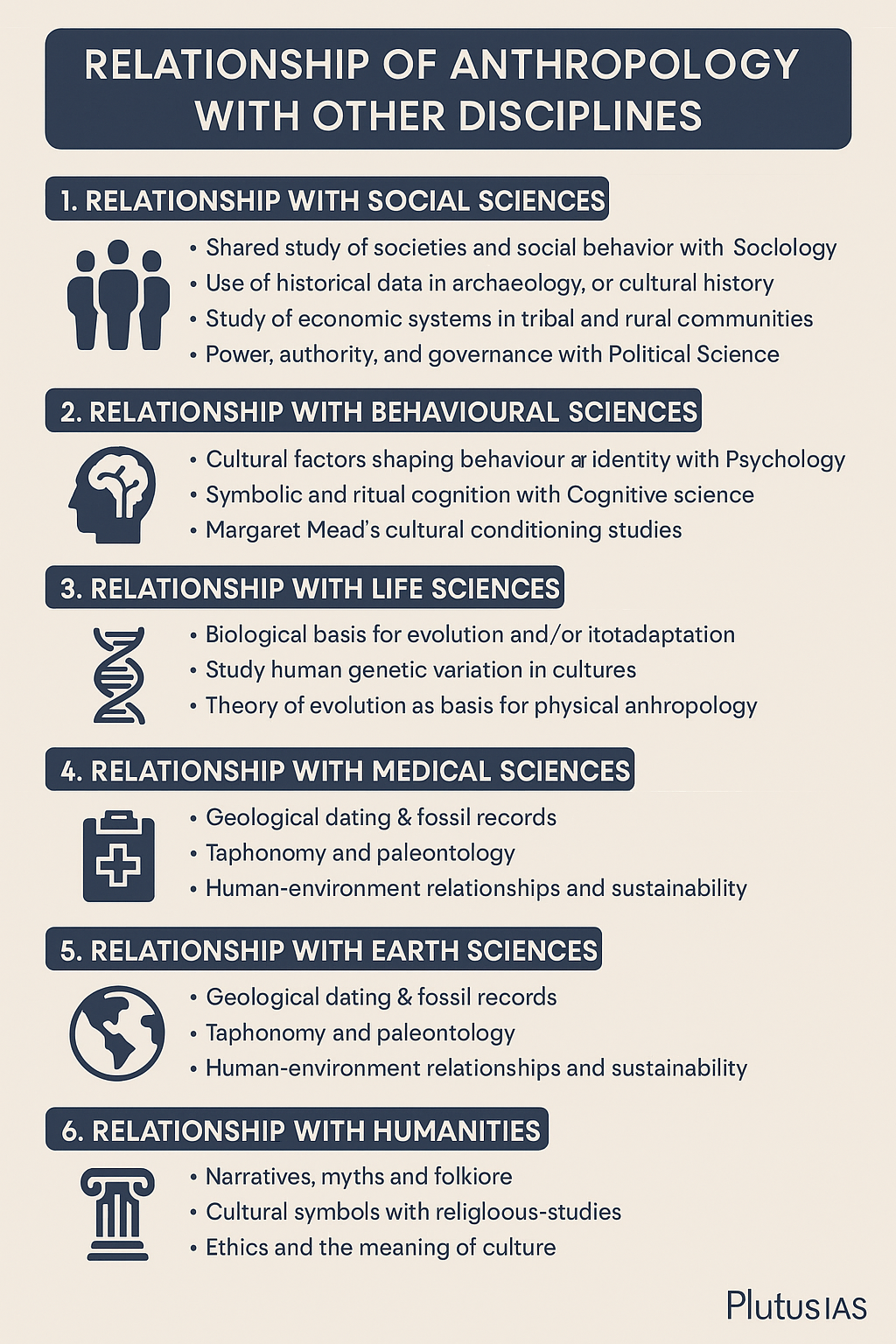
20 Jul Relationship of Anthropology with Other Disciplines
Relationship of Anthropology with Other Disciplines
Introduction
Anthropology is an integrative, interdisciplinary discipline that draws upon knowledge from both natural sciences and social sciences to holistically study human beings. The very essence of anthropology lies in its ability to bridge various fields to understand the biological, social, cultural, and linguistic diversity of humans across time and space. This makes anthropology uniquely positioned among academic disciplines to serve as a connective link across several branches of human knowledge.
1. Relationship of Anthropology with Social Sciences
Anthropology shares close links with other social sciences like sociology, political science, economics, and history.
Sociology
- Both study human societies and social behavior.
- Anthropology focuses more on tribal and small-scale societies, while sociology traditionally deals with complex, industrial societies.
- Concepts like social stratification, kinship, and religion are studied in both fields.
- Notable overlap: Emile Durkheim, A.R. Radcliffe-Brown, and M.N. Srinivas contributed to both fields.
History
- Archaeological anthropology uses historical data, monuments, and artifacts to reconstruct ancient societies.
- Cultural history helps understand the evolution of norms and traditions.
Economics
- Anthropologists study systems of production, exchange, and consumption in tribal and rural communities.
- Concepts like reciprocity, redistribution, and market exchange have economic as well as anthropological relevance.
Political Science
- Political anthropology focuses on power, authority, governance, and leadership in stateless societies.
- Explores concepts such as lineage-based power systems, segmentary lineage systems, and chiefdoms.
2. Relationship with Behavioural Sciences
Behavioural sciences include disciplines such as psychology and cognitive science, which help understand human behavior at the individual level.
Psychology
- Studies of perception, personality, cognition, and learning contribute to psychological anthropology.
- Anthropologists analyze how cultural factors shape individual behavior and identity.
- Margaret Mead’s work in Samoa highlighted adolescence as culturally conditioned.
Cognitive Science
- Helps understand how the brain processes language, symbolism, and rituals, which are key anthropological themes.
- Structuralist anthropology (e.g., Claude Lévi-Strauss) overlaps with cognitive approaches.
3. Relationship with Life Sciences
Life sciences include biology, genetics, and evolutionary science. Biological anthropology is deeply rooted in these disciplines.
Biology
- Provides the basis for understanding human evolution, adaptation, and speciation.
- Topics such as primatology, comparative anatomy, and physical traits draw heavily from biology.
Genetics
- Anthropologists study human genetic variation, inheritance, and population genetics.
- Helps in tracing lineage, racial groups (biologically defined populations), and evolutionary adaptations.
Evolutionary Biology
- The foundation of physical anthropology lies in Darwinian theory of natural selection.
- Study of hominid fossils is possible through evolutionary theory.
4. Relationship with Medical Sciences
Medical anthropology is a prominent applied field that intersects with medicine, public health, and epidemiology.
- Studies health, illness, disease perception, and healing practices in different cultures.
- Bridges traditional and modern systems of medicine (e.g., Ayurveda, Unani, tribal healing, biomedicine).
- Analyzes how socio-cultural beliefs affect health-seeking behavior.
- Engages with issues of malnutrition, reproductive health, maternal mortality, and public health policy.
- Medical anthropologists contribute to designing culturally appropriate health programs.
5. Relationship with Earth Sciences
Earth sciences include geology, ecology, paleontology, and geography. These disciplines help anthropologists contextualize human existence in natural environments.
Geology and Paleontology
- Essential for understanding fossil records, formation of archaeological sites, and taphonomy.
- Geological dating techniques (stratigraphy, radiocarbon dating) help date hominid remains and artifacts.
Ecology
- Ecological anthropology studies human interaction with the environment.
- Focuses on cultural adaptation, carrying capacity, and sustainability.
- Key contributors: Julian Steward, Roy Rappaport.
6. Relationship with Humanities
The humanities – including literature, philosophy, and the arts – provide critical and interpretive tools to study human culture and values.
- Anthropology borrows from literature to understand narratives, myths, and folklore.
- Symbolic anthropology studies cultural symbols and their meanings, intersecting with religious studies and philosophy.
- Philosophy helps in conceptual analysis of human nature, ethics, and the meaning of culture and civilization.
Holistic Nature of Anthropology through Interdisciplinary Linkages
The strength of anthropology lies in its holistic approach. It merges biological, socio-cultural, historical, and linguistic elements into one coherent understanding of the human condition. This integration is made possible through its extensive borrowing and collaboration with multiple disciplines.
Real-Life Application Examples:
- Use of anthropological insight in framing tribal health policies (Medical + Cultural Anthropology).
- Archaeological studies for climate change insights (Earth Science + Environmental Anthropology).
- Application of anthropometric data for sports medicine and defense services (Life Sciences + Applied Anthropology).
Previous Year Questions (PYQs) from UPSC Anthropology Optional
- 2023: Examine the interdisciplinary nature of anthropology with examples.
- 2021: Describe the relationship of anthropology with life sciences and medical sciences.
- 2020: Anthropology is an interdisciplinary subject. Discuss with suitable examples.
- 2017: Elaborate on the relevance of anthropology in the study of tribal health problems.
- 2015: Discuss the relationship of anthropology with social sciences.
Probable Questions for UPSC Mains 2025
- Discuss the interdisciplinary character of anthropology and its relevance in today’s world.
- How does anthropology integrate life sciences and behavioural sciences to study human beings?
- Anthropology is both a natural science and a social science. Justify.
- Explain the significance of ecological and geological knowledge in anthropological research.
- Highlight the contribution of medical anthropology in understanding public health issues in India.
Conclusion
Anthropology, by virtue of its holistic and interdisciplinary nature, serves as a unique discipline that unites the analytical methods of sciences with the interpretive understanding of the humanities. Its collaboration with social sciences, life sciences, behavioural sciences, and other fields makes it an indispensable tool for understanding the complexities of human life, society, and evolution. For UPSC aspirants, this topic not only forms the bedrock of Paper 1 but also lays the foundation for writing integrated and analytical answers across the syllabus.




No Comments